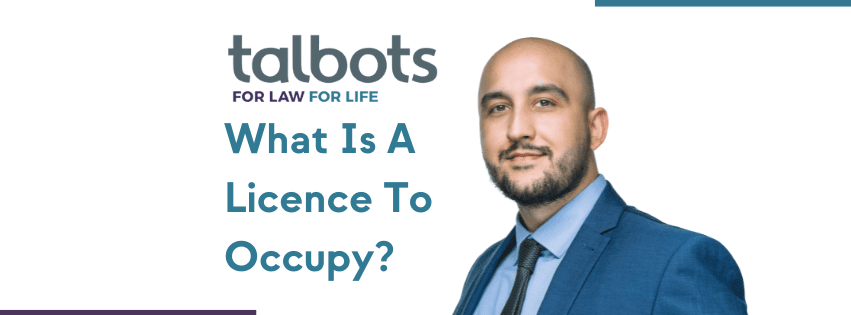An Assured Shorthold Tenancy (AST) is the most commonly used type of private tenancy in the United Kingdom, however, there are other less commonly known circumstances where an individual can occupy a property. One of these circumstances is where an individual has been granted a licence to occupy a property.
What is a licence to occupy?
A licence to occupy is an agreement between a property owner and another person that allows that person to occupy their property. A licence does not normally grant a person the right to exclusive occupation of the property, nor does it provide a person with a legal interest in the property. Without a licence the person would be deemed a trespasser. A licence to occupy can be granted for a fixed period of time or be periodic (normally weekly or monthly).
How can a licence to occupy be granted?
There are two ways in which a licence can be given, these are:
- Bare licence – where permission is given to another person to live in a property. A bare licence doesn’t have to be in writing and can be given verbally.
- Contractual licence – where a licence arises out of a contract. The contract can be either verbally agreed or in a written document. Normally a contractual licence would require a person to pay money or perform a service in return for the accommodation but where the conditions for creating a tenancy are not met.
There are many circumstances where a bare licence may be given to a person, where it was not the property owner’s intention of providing one. One example is where a relative or friend has given permission to a person to occupy a property.
Another increasingly occurring example, is where a property owner has allowed a family member or friend to live with them and the property owner has subsequently passed away, leaving the licensee living in the property. In this example the deceased property owner has given a bare licence to their family member to occupy the property, and this can sometimes cause issues for an executor or administrator of an estate when they wish to sell the property later.
Legal protections for a licensee
A licensee is not afforded the same security and protections as a tenant who occupies a property under an Assured Shorthold Tenancy Agreement. However, limited statutory protections do exist for licensees under the Protection from Eviction Act 1977. The act states that it is unlawful for an owner to re-enter a property licensed as a dwelling if the following criteria applies:
- The occupier does not have an excluded licence.
- The occupier has not vacated the property.
A licence may be an excluded licence if the licensor shares any of the accommodation with the licensee, however, there are many other scenarios where a licence will be deemed an excluded licence.
Can a licensee be evicted?
Yes, but caution must be observed in regards to removing a licensee. It is not advisable to change the locks without first obtaining expert legal advice beforehand, as the property owner will need to be aware of any possible counterclaims that can be made by the occupier of the property. If the Protection from Eviction Act 1977 applies to the licence, then the property owner will need to serve a legal notice on the licensee in order to terminate their licence. Should the licensee remain in occupation of the property after the end date on the notice, then the occupant will be a trespasser and court action will be required to remove them.
If the occupant has an excluded licence, then the protections afforded under the Protection from Eviction Act 1977 will not apply, but a careful analysis will need to be undertaken in order to determine this, particularly because even where a licence is excluded, the property owner still needs to consider the criminal offences that can be committed when trying to gain entry to the property.
The fact that an agreement purports to create a licence does not mean that it will be construed as a licence, and not a tenancy. In the case of Street v Mountford, the House of Lords held that the court should look at the substance as well as the form of the agreement in deciding whether an agreement is a licence or a tenancy. Parties cannot turn what is in reality a tenancy, into a licence, by calling it a licence. Even if a document is labelled a licence, case law illustrates that the courts are prepared to look beyond that label and might find that a tenancy exists.
How can Talbots Law help?
Our Property Dispute Resolution team has extensive experience dealing with licensors and licensees, so please do not hesitate to get in touch with one of our Landlord and Tenant specialists who will be happy to assist.
Call our team on 0800 118 1500 or email newbusiness@talbotslaw.co.uk
Disclaimer
The contents of this blog or any other published by Talbots Law cannot be considered as legal advice. You should take no action without prior consultation with a qualified solicitor or legal professional. The contents of this blog refers to the process in England and Wales.
